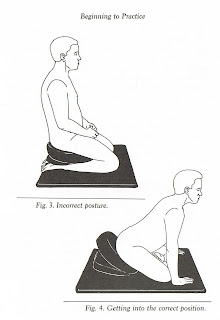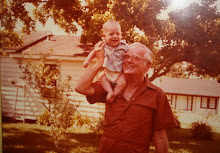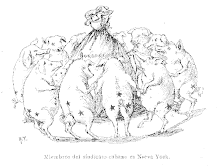My father, like many old men, has grown fascinated with his own genealogy. Indeed, the intensity of his fascination seems to rise commensurately with his age. When searching for his Christmas present last year I considered this and decided trace his family tree. Hell, it's about time I put those two history degrees I've acquired to work! I gathered what information he had, spoke to a few of our oldest living relatives, and started digging around.
Granted, there were a lot of lacunae, and I took a number of educated guesses about who fathered whom. But in the end, I managed to put together a mostly reliable and relatively interesting family tree that stretched from Louisiana to Lorraine. In fact, I was so satisfied with both the hunt and the product that I decided to research my mother’s family’s background.
Unlike on my father’s side of the family, my mother’s side had done quite a bit more record keeping over the years. Considering the socio-economic differences between these two sides—my father’s tree includes a number of property owners and doctors, while my mother’s side is populated heavily with illiterate French-speaking peasants—this seemed strangely counterintuitive. To date, I’m still mostly stumped by this apparent paradox. But, getting back to the story here . . . .
Paw-paw Logan, as my last surviving grandparent, was the logical person to speak with first. And, even at 91 years old he’s sharp as a tack. The man is still racing his Ford around Abbeville, eating Sausage, Gravy and Rice for dinner most nights, and still telling mildly off-color jokes about how dark the natives were in Borneo—something about how coal would leave a white mark on their skin.
Together we dug through several crates and wooden chests to find every old picture he had in his house. Along the way we turned up many interesting documents, like my grandmother’s baptismal certificate, his marriage license, his Army discharge papers, and a few records from the Billups Station he managed for so many years.
 However, the most interesting document I found during my search was a census record that recorded the name and address of my great grandfather Louis Sarazin Mathiue in 1900. This was a huge find. With it, I now knew for sure that he was neither literate nor English-speaking. Also, since he was living with a Chiasson family at that time, I confidently deduced from this that his own family had likely either died or were so destitute they could no longer support him. Without this single page, this aspect of Louis’ life would be lost forever. And all this was possible because over one hundred and ten years ago some poor guy went from door to door in backwater Acadiana (undoubtedly accompanied by an interpreter) asking people a few simple questions.
However, the most interesting document I found during my search was a census record that recorded the name and address of my great grandfather Louis Sarazin Mathiue in 1900. This was a huge find. With it, I now knew for sure that he was neither literate nor English-speaking. Also, since he was living with a Chiasson family at that time, I confidently deduced from this that his own family had likely either died or were so destitute they could no longer support him. Without this single page, this aspect of Louis’ life would be lost forever. And all this was possible because over one hundred and ten years ago some poor guy went from door to door in backwater Acadiana (undoubtedly accompanied by an interpreter) asking people a few simple questions. Now, I dig this shit. (Hell, I better dig it, because it’s an interest that promises neither wealth nor even work.) But, because of this interest, I’m always conscious of the marks I’m leaving on history. I’m aware of my own immortality, if you will. How much of a trace will be left of me when I’m gone? What impression will some future historian or genealogist get of me when he/she discovers this or that bit of my life? What will one learn of me through my writing, my passports, my many addresses, my criminal record?
This year Heejung and I filled out our own census form. And, like usual, my predilection for leaving a historical trace piqued my interest in the situation immediately. Just like when my great grandfather Louis lived for a short while as a Farm hand in his benefactor’s home, we are also in a transitional place and time. Years from now (hopefully not 110 years later) one or a few of our distant progeny might stumble across a record of us (a Korean national and a Coonass) living in a house we don’t own in rural Virginia, and he’ll come to a few conclusions. He might learn finally, (if he was wondering) why his eyes are a little longer. He might pause for a minute to consider our lives and times. He might imagine what it was like to be so peripatetic back in the “good ol’ days.” At least I hope he will. I’m leaving him the fucking breadcrumbs for god’s sake!!























